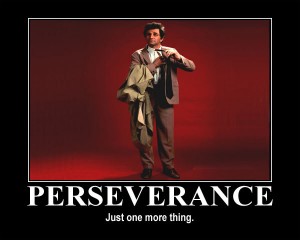 You’ve often heard that the best defense is a good offense when related to the strategy that sports teams employ, but this is also a key principle that can be applied in defending the Christian faith. If you are finding it difficult to stand up for what you believe as a Christian case-maker, and finding yourself in a defensive position more often than not, perhaps you should employ a conversational method that will help you to ‘turn the table’ and put the other person(s) in a defensive position so they will have to stand up for what they believe. The method I’m referring to is simpler, and even easier than you might think–it’s all about learning to ask a few strategic questions.By asking questions we engage in worldview apologetics, that is, we are able to get below the surface of someone’s rhetoric and ideas so as to reveal and engage their worldview. Therefore, a question properly and strategically used can both drive a point home and cause other people, whether they be an individual, or in a group setting, to pause and reexamine the soundness of their worldview. Concisely put, it is all about reversing the burden of proof and leveling the worldview playing field. (More on this below)
You’ve often heard that the best defense is a good offense when related to the strategy that sports teams employ, but this is also a key principle that can be applied in defending the Christian faith. If you are finding it difficult to stand up for what you believe as a Christian case-maker, and finding yourself in a defensive position more often than not, perhaps you should employ a conversational method that will help you to ‘turn the table’ and put the other person(s) in a defensive position so they will have to stand up for what they believe. The method I’m referring to is simpler, and even easier than you might think–it’s all about learning to ask a few strategic questions.By asking questions we engage in worldview apologetics, that is, we are able to get below the surface of someone’s rhetoric and ideas so as to reveal and engage their worldview. Therefore, a question properly and strategically used can both drive a point home and cause other people, whether they be an individual, or in a group setting, to pause and reexamine the soundness of their worldview. Concisely put, it is all about reversing the burden of proof and leveling the worldview playing field. (More on this below)
Before diving into the how-to’s of the art of strategic question asking, one point needs to be made, and that is this–how you ask questions, that is, your attitude and motivation in asking questions, will reveal whether you want to persuade someone of the truth or just win an argument. We must remember the early apostles instruction in how to conduct ourselves when presenting the Gospel, that we do so “with gentleness and respect.” (1 Peter 3:15) “Let your speech always be gracious, seasoned with salt, so that you may know how you ought to answer each person.” (Col. 4:6) “…correcting his opponents with gentleness. God may perhaps grant them repentance leading to a knowledge of the truth. (2 Tim. 2:25) As Martin Luther aptly put it, “We are all mere beggars showing other beggars where to find bread,” the Bread of Life. (John 6:35)
Now let’s see if we can upgrade our question asking ability so as to be effective case-makers for the Christian worldview. Asking questions is an excellent strategy for three reasons:
1. It is low risk. If the person you are engaging (e.g. your professor, a classmate, a friend) becomes angry or defensive at your questions, then you can simply stop asking questions or change the subject.
2. Asking questions helps you to understand the other person’s train of thought—where they began their thinking, how their thinking progressed, and the exact conclusion they are trying to proffer. In other words, asking questions helps you to understand them. And understanding is a primary step in seeking to persuade people of the truth.
3. Asking questions is the mark of an educated person. Recall the Bible story of Jesus visiting the temple as a twelve-year-old boy. The Bible says that his parents found him “sitting among the teachers, listening to them and asking them questions. Everyone who heard him was amazed at his understanding and his answers” (Luke 3:46-47). How can you “ask questions” and “give answers” at the same time? Hebrew students could demonstrate their learning by responding to a question with an equally well-phrased and ponderous question. To this day, those who ask good questions are seen as more intelligent and well-informed.
Now, what sort of questions should we be asking? Start with questions that are at the heart of the other person’s worldview. Such questions put them in a position where they have to back up and defend the assumptions they are presenting. Along this line, I would suggest a series of reflective questions that Greg Koukl presents in his excellent book, Tactics:
Question #1: What do you mean by_______________?
Always begin by asking the other person to define their terms.
Question #2: How did you come to that conclusion?
This question is especially helpful in coming to understand how a person is thinking.
Question #3: How do you know that to be true?
There is no need to ask whether or not they believe that what they believe is the truth. All we are doing is simply asking them to supply some good reasons to show that what they are claiming to be true is in fact true.
Question #4: Why do you believe that you are right?
Christians should always be ready, on any given subject, to give rudimentary reasons why they believe as they do. But we should in turn be ready to ask others, “Why do you believe as you do?”
Question #5: Where do you get your information?
We believe that in most college classes, at least 30% of what is said is actually the opinion of the professor, and not necessarily based on any direct evidence at all. To see whether this is true, students should be trained to ask, “Excuse me, where do you get the information to prove that what you are saying is true?”
Question #6: What happens if you are wrong?
Nobody likes to think about the consequences if what they believe is wrong.
Greg Koukl goes on to explore the dynamics of how Christians can thoughtfully engage there surrounding culture through the art of asking questions in conversation. Koukl gives four reasons as to the advantages of developing this art.
1. Sincere questions are friendly and flattering. The invite genial interaction on something the other person cares a lot about: their own ideas.
2. You will receive an education. You’ll leave the conversation knowing more than when you arrived. Sometimes that information will be just what you need to make a difference. When a young man asked me to recommend a book on Buddhism so he could witness to his Buddhist friend, I told him not to bother with the book. Instead, ask the Buddhist. Sit down over coffee and let him give the tutorial. It’s a lot easier, he’d be learning the specifics of his friend’s own convictions (instead of some academic version), and he’d be building a relationship at the same time.
3. Questions allow you to make progress on a point without being pushy [and/or overbearing]. Since questions are largely neutral, or at least seem that way, they don’t sound “preachy.” When you ask a question, you aren’t actually stating your own view and therefore have nothing to defend…You can relax and enjoy the conversation while you wait for an easy opening.
4. Finally, and most importantly, carefully placed questions put you in the driver’s seat. Being an asker allows you control of the situations that statement-makers rarely achieve. An alert questioner can judge when someone grows uneasy. But don’t stop, just change directions…Once you learn how to guide a conversation, you have also learned how to control it.
 In conclusion, Koukl states, “There are three basic ways to use Columbo (the name of Koukl’s strategy plan). Each is launched by a different model question. These three applications comprise the game plan I use to tame the most belligerent critic. Sometimes I simply want to gather information. Other times, I ask a question to reverse the burden of proof, that is, to encourage the other person to give the reasons for their own views. Finally, I use the question to lead the conversation in a specific direction.” [2]
In conclusion, Koukl states, “There are three basic ways to use Columbo (the name of Koukl’s strategy plan). Each is launched by a different model question. These three applications comprise the game plan I use to tame the most belligerent critic. Sometimes I simply want to gather information. Other times, I ask a question to reverse the burden of proof, that is, to encourage the other person to give the reasons for their own views. Finally, I use the question to lead the conversation in a specific direction.” [2]
For more on conversational evangelism, click here
You can also contact the author of this article, that’s me, Lane, at: 4Lane.davis@gmail.com
[1] Koukl, Gregory, Tactics-A Game Plan for Discussing Your Christian Convictions, Zondervan, 2009, pg.
Tactics Video Study, Session 1: The Columbo Tactic-by Gregory Koukl








